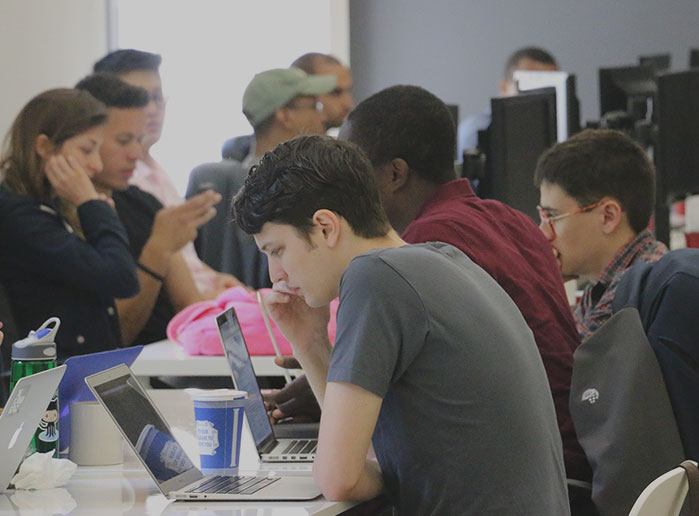This post originally appeared on March 23, 2015.
While attending University of Michigan as a Spanish and Linguistics major, Flatiron School alum Jen Eisenberg spent a summer learning to program in our Web Development Immersive. When she returned to college for her Senior year, she had a new skillset and a new direction in her studies. Now a Software Developer at Paperless Post, Jen shares some insights on her path below.
 What made you want to learn software development?
What made you want to learn software development?
I went to college at the University of Michigan, where I majored in Spanish and Linguistics, but as a freshman, I didn’t know exactly what I wanted to do (a sentiment most freshman share). I was always very interested in technology, especially how humans interact with technology. After some encouragement from my older brother who felt that coding would be a vital skill soon, I took a couple of programming courses. Ultimately I decided to pursue my passion for languages and ended up attending Flatiron School over the summer between my Junior and Senior years.
Why did you decide against a computer science degree?
There was a point in time where I thought I’d be a CS major. I took a few courses my freshman year but I became discouraged after my first programming course as I couldn’t build a website. I remember saying that I felt “stuck in the terminal” because the focus for entry level programming courses wasn’t on web development and design. Michigan has an incredible CS curriculum and I have many friends who came out of the program building incredible web apps and software programs, but I decided to go a different route and pursue other passions coupled with learning programming outside of the traditional classroom setting.
After having such a discouraging experience with traditional CS classes, what drew you back in to programming?
It was languages, actually. There a lot of sub-sections of linguistics—psychological, anthropological, and also computational. The computational side of linguistics and natural language processing really drew me in and reinforced the need for me to learn how to program. Junior year, I started to dabble in the plethora of online tutorials, but they were really overwhelming. I had no idea what path to take or what language to start with. I needed guidance, and I thought a unique route would be to dedicate this summer to programming. I did a lot of research to determine what would be the most worthwhile way to spend my summer really learning how to code. That’s when I applied to Flatiron School.
Flatiron’s style of teaching was a great fit for me. It was amazing to actually build programs from day one as the reward is instant. Physically creating something is one of the best feelings ever. Seeing something I made on the screen was just mind-blowing—even when it only said, “Hello, World.”
Taking a 12-week programming course seems like an unconventional summer.
Indeed! I’m fortunate to have had the option and I can truly say it changed my life. A lot of people thought it was crazy to give up a summer internship right before graduation as my classmates thought that was a direct path to a job. Forgoing that summer of dedicated learning would have been a true loss. Coding has changed the way I think about problem solving and how I approach linguistic challenges.
What was it like going back to college for Senior year? Were you able to use what you learned?
At first, I wasn’t sure I wanted to go back. My Flatiron School classmates were getting jobs, and I felt like I was over college experience and ready to work. Ultimately (with my parents encouragement) I went back to Michigan for my senior year. College was completely different after I learned how to program. I took different classes, met new people (many of whom are some of my closest friends now), and went to hack-a-thons on weekends. It was by far the best year I had because I had a totally new direction. I left Michigan on such a positive note – there was this whole aspect of the university that I had never seen before and it was amazing.
“College was completely different after I learned how to program. I took different classes, met new people, and went to hackathons on weekends… I had a totally new direction.”
I dove into this cross-section of computer science and linguistics. Once I learned to program, I was able to find the distinct sector of my degree. Senior year I built some cool projects in a graduate level computational linguistics course. For example, I ended up working with a team on a voice recognition system where we could input thirty essays by an author, and the machine could recognize which author wrote the essays based on twenty different parameters. It wasn’t 100% accurate, but it was cool to be able to use something I learned outside of college and combine it with techniques I curated at school.
That’s great. It sound like you were able to leverage the resources that come along with college and find your niche.
Absolutely. I found this whole community I had no idea existed and who didn’t know that I existed. They’d ask me, “How do you know Ruby—they don’t teach Ruby here.” We ended up learning a lot from each other. The CS students taught me about data structures and algorithms for example—and I was able to teach them about Ruby and Rails and web apps. I joined an incredible community on Michigan’s campus called Shift. It is a house on campus dedicated to students who want to build and create and explore the future with technology. The space was always open to code, design or just bounce ideas off each other. It reminded me of the Flatiron School culture in a lot of ways and I certainly wouldn’t have found this awesome space if I hadn’t learned to code that summer.
So where did that lead you? What are you working on now?
I feel fortunate to be where I am today. I graduated school in May, 2014, and two weeks later, I started working at Paperless Post as a software developer . Ultimately, I wanted to work on a product I actually used and loved with awesome people. Working at PP has been such an incredible experience. I’ve learned so much from all the people who work there about coding and working on a team towards a greater goal. Paperless Post culture also reminds me of Flatiron’s or Shift’s in that we have weekly developer talks and quarterly hackathons. There is still a huge amount for me to learn as a developer and I couldn’t be happier to do it here at PP.
Do you have any advice for people who are in your position—who are in college or about to go college and want to learn how to program?
I get two types of emails from prospective Flatiron School students who are thinking of attending Flatiron School while in college. The first is, “Do I go back? ” I always encourage them to go back because of the way my experience unfolded. Colleges (especially Michigan in my experience) have so much to offer students without the restrictive working hours that come with a full-time job. I had plenty of time to learn new technologies and stay up all night at hackathons consequence-free.
The second type of email I get is from people who are not enrolled in college yet. These people wonder, “Do I do attend Flatiron instead of college?” In these cases, If they have the resources, I always suggest they take both Flatiron School and college courses. It’s really the best of both worlds. If they don’t have the resources to do that, but they know they really love to code meaning they have invested time in building, Flatiron School would definitely be a viable alternative to college.
There are so many great meetups and hackathons and resources online and here in NYC. My advice is meet new people, learn new technologies and keep building.
Stay in touch with Jen on Twitter or read more alumni stories.
Written byFLATIRON SCHOOL
Make yourself useful.

